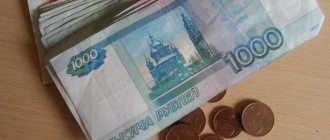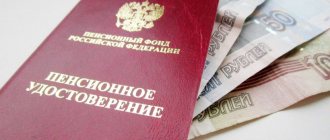- home
- Reference
- Finance
Persons of retirement age today form a fairly wide segment of the population, which is considered the most socially vulnerable.
Most pensioners cannot earn their own living. All money at their disposal is issued by the state and relates to social payments.
- 3.1 If the amount is lower, what to do and where to go 3.1.1 Social
What does a pensioner's living wage include?
First you need to understand what the living wage is. This is a certain amount of money paid by the state to unsecured or needy pensioners whose income is below average.
Basically, these funds are used to purchase food, detergents, medicines, as well as those types of services that are needed.
It also consists of two components, namely:
- Physiological needs are those material items without which it is impossible to imagine the ordinary life of any person. They make up more than 80% of all money allocated for the cost of living.
- Social needs - it includes a full set of spiritual and mental values.
Important! It is worth noting that the amount of these payments is determined individually for each pensioner, since everyone has a different income. It also all depends on the region of residence of the elderly person.
How are calculations made?
For certain categories of the country's population, its own subsistence level (LS) is established. This is a conditional value that should ensure an acceptable standard of living in today’s current economic conditions and purchasing power. In fact, the minimum subsistence level is a person’s monthly salary.
The regulatory framework that determines the procedure for calculating the minimum subsistence level is contained in Federal Law No. 134-FZ, approved in 1997. Articles of the law provide for the calculation of indicators no later than the previous three months. At the same time, the reliability of the data depends on the capabilities of the region and the social interests of the local population. All this together should be used by the executive authorities of the constituent entities of the Russian Federation when determining the amount of the subsistence minimum. First, the cost of living in the capital and other Russian cities is calculated for citizens of three specific categories:
- those who continue to work but have not retired;
- those who have already retired;
- children.

The cost of living is calculated for three categories of citizens
Note ! _ Based on these figures for individual categories, an average value is derived - a per capita indicator.
How high the indicator is is important for determining the level of well-being of the population, approving the minimum wage, when planning the size of budget payments to various categories of the population (low-income people, large families, students of higher educational institutions, pensioners).
Let's consider the processes of social support using the subsistence level in the capital of Russia. Based on Order No. 23 of May 15, 2002, the city of Moscow provides for the use of PM when providing social benefits in the following categories:
- in the form of child support;
- for the purpose of one-time or monthly payments - compensation to those in need;
- in the form of a one-time cash benefit to city residents who find themselves in extreme situations;
- as a social scholarship for low-income students of higher educational institutions.
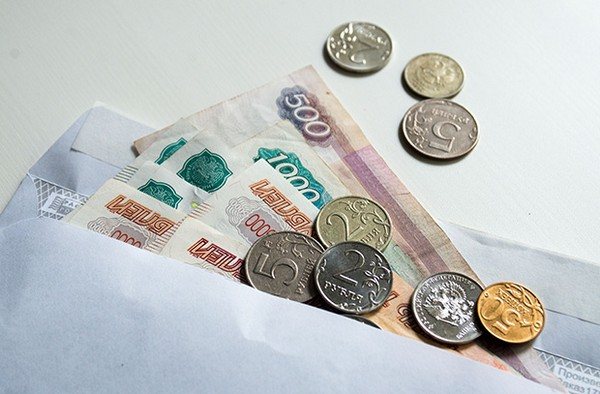
PM is used when calculating benefits, scholarships, daily allowance, etc.
Note ! _ The cost of living in Moscow, calculated on average per capita of capital residents, from January 1, 2020 was just over 16 thousand rubles.
The data was obtained using expenditure figures for the above categories of citizens for the period of the 3rd quarter of 2020.
The power structures of local self-government of the constituent entities of the Russian Federation have the legal authority to establish the minimum wage based on the data of a specific region. Setting the minimum wage is the result of a collective process. Representatives of all interested parties take part in it:
- trade union associations that represent the interests of employees of companies and organizations;
- representatives of the administration, employers who must coordinate their activities with legislation and labor agreements;
- representatives of city authorities.
What is the cost of living for a pensioner in 2019?

As mentioned earlier, the cost of living depends on many factors and is determined according to several categories, namely:
- Place of residence of the pensioner.
- Amount of pension payments.
- Availability of an additional source of income.
Elena Smirnova
Pension lawyer, ready to answer your questions.
Ask me a question
The main and key factor is still the region in which the elderly person lives. This is due to the fact that each of them has its own salaries and prices.
The cost of living for a pensioner in a constituent entity of the Russian Federation
We present to your attention a table with the regions, as well as the minimum amounts of cash payments that they are entitled to this year.
| № | The subject of the Russian Federation | Sum | NPA |
| 1 | Altai region | 8 669 | Law of November 2, 2018 No. 91-ZS |
| 2 | Amur region | 8 846 | Law of October 31, 2018 No. 256-OZ |
| 3 | Arhangelsk region | 10 258 | Law of October 26, 2018 No. 15-2-OZ |
| 4 | Astrakhan region | 8 352 | Law of October 26, 2018 No. 101/2018-OZ |
| 5 | Belgorod region | 8 016 | Law of November 27, 2018 No. 310 |
| 6 | Bryansk region | 8 523 | Law of October 24, 2018 No. 72-Z |
| 7 | Chechen Republic | 8 735 | Law of December 5, 2018 No. 59-RZ |
| 8 | Chelyabinsk region | 8 691 | Law of October 30, 2018 No. 804-ZO |
| 9 | Chukotka a.o. | 19 000 | Law of October 30, 2018 No. 65-OZ |
| 10 | Chuvash Republic | 7 953 | Law of October 19, 2018 No. 65 |
| 11 | Jewish Autonomous Region | 9 166 | Law of October 25, 2018 No. 316-OZ |
| 12 | Saint Petersburg | 8 846 | Law of November 30, 2018 No. 711-714 |
| 13 | Sevastopol | 8 842 | Law of December 17, 2018 No. 463-ZS |
| 14 | Khabarovsk region | 10 895 | Law of October 24, 2018 No. 371 |
| 15 | Khanty-Mansi Autonomous Okrug-Yugra | 12 176 | Law of October 16, 2018 No. 69-oz |
| 16 | Irkutsk region | 8 841 | Law of October 30, 2018 No. 82-OZ |
| 17 | Ivanovo region | 8 576 | Law of November 1, 2018 No. 51-OZ |
| 18 | Kabardino-Balkarian Republic | 8 846 | Law of September 27, 2018 No. 24-RZ |
| 19 | Kaliningrad region | 8 846 | Law of November 19, 2018 No. 224 |
| 20 | Kaluga region | 8 708 | Law of October 31, 2018 No. 397-OZ |
| 21 | Kamchatka Krai | 16 543 | Law of September 27, 2018 No. 250 |
| 22 | Karachay-Cherkess Republic | 8 846 | Law of October 29, 2018 No. 67-RZ |
| 23 | Kemerovo region | 8 387 | Law of October 29, 2018 No. 80-OZ |
| 24 | Kirov region | 8 474 | Law of September 27, 2018 No. 182-ZO |
| 25 | Kostroma region | 8 630 | Law of October 18, 2018 No. 469-6-ZKO |
| 26 | Krasnodar region | 8 657 | Law of October 30, 2018 No. 3882-KZ |
| 27 | Krasnoyarsk region | 8 846 | Law of November 23, 2018 No. 6-2201 |
| 28 | Kurgan region | 8 750 | Law of October 30, 2018 No. 118 |
| 29 | Kursk region | 8 600 | Law of October 31, 2018 No. 61-ZKO |
| 30 | Leningrad region | 8 846 | Law of December 20, 2018 No. 130-oz |
| 31 | Lipetsk region | 8 620 | Law of October 29, 2018 No. 214-OZ |
| 32 | Magadan Region | 15 460 | Law of November 1, 2018 No. 2305-OZ |
| 33 | Moscow region | 9 908 | Law of October 30, 2018 No. 180/218-OZ |
| 35 | Murmansk region | 12 674 | Law of October 26, 2018 No. 2295-01-ZMO |
| 36 | Nenets a.o. | 17 956 | Law of October 29, 2018 No. 6-oz |
| 37 | Nizhny Novgorod Region | 8 102 | Law of October 2, 2018 No. 88-z |
| 38 | Novgorod region | 8 846 | Law of October 29, 2018 No. 315-OZ |
| 39 | Novosibirsk region | 8 814 | Law of October 31, 2018 No. 304-OZ |
| 40 | Omsk region | 8 480 | Law of October 5, 2018 No. 2102-OZ |
| 41 | Orenburg region | 8 252 | Law of October 25, 2018 No. 1284/344-VI-OZ |
| 42 | Oryol Region | 8 730 | Law of November 6, 2018 No. 2283-OZ |
| 43 | Penza region | 8 404 | Law of September 25, 2018 No. 3243-ZPO |
| 44 | Perm region | 8 539 | Law of November 1, 2018 No. 299-PK |
| 45 | Primorsky Krai | 9 988 | Law of October 30, 2018 No. 365-KZ |
| 46 | Pskov region | 8 806 | Law of November 7, 2018 No. 1886-OZ |
| 47 | Republic of Adygea | 8 138 | Law of October 31, 2018 No. 177 |
| 48 | Altai Republic | 8 712 | Law of November 20, 2018 No. 74-RZ |
| 49 | Republic of Bashkortostan | 8 645 | Law of October 29, 2018 No. 1-з |
| 50 | The Republic of Buryatia | 8 846 | Law of October 31, 2018 No. 136-VI |
| 51 | The Republic of Dagestan | 8 680 | Law of October 30, 2018 No. 63 |
| 52 | The Republic of Khakassia | 8 782 | Law of December 10, 2018 No. 66-ЗРХ |
| 53 | The Republic of Ingushetia | 8 846 | Law of October 26, 2018 No. 43-rz |
| 54 | Republic of Kalmykia | 8 081 | Law of September 26, 2018 No. 6-VI-3 |
| 55 | Republic of Karelia | 8 846 | Law of October 22, 2018 No. 2286-ZRK |
| 56 | Komi Republic | 10 742 | Law of October 29, 2018 No. 77-RZ |
| 57 | Republic of Crimea | 8 370 | Law of November 1, 2018 No. 535-ZRK/2018 |
| 58 | Mari El Republic | 8 191 | Law of November 1, 2018 No. 53-Z |
| 59 | The Republic of Mordovia | 8 522 | Law of October 31, 2018 No. 80-З |
| 60 | The Republic of Sakha (Yakutia) | 13 951 | Law of October 19, 2018 2050-Z No. 11-VI |
| 61 | Republic of North Ossetia-Alania | 8 455 | Law of November 6, 2018 No. 84-RZ |
| 62 | Republic of Tatarstan | 8 232 | Law of September 25, 2018 No. 50-ZRT |
| 63 | Tyva Republic | 8 846 | Law of November 30, 2020 No. 448-ZRT |
| 64 | Rostov region | 8 488 | Law of November 1, 2018 No. 31-ZS |
| 65 | Ryazan Oblast | 8 568 | Law of October 31, 2018 No. 65-OZ |
| 66 | Sakhalin region | 12 333 | Law of December 11, 2018 No. 73-ZO |
| 67 | Samara Region | 8 413 | Law of October 31, 2018 No. 85-GD |
| 68 | Saratov region | 8 278 | Law of October 26, 2018 No. 99-ZSO |
| 69 | Smolensk region | 8 825 | Law of October 25, 2018 No. 105-z |
| 70 | Stavropol region | 8 297 | Law of November 2, 2018 No. 91-kz |
| 71 | Sverdlovsk region | 8 846 | Law of November 6, 2018 No. 126-OZ |
| 72 | Tambov Region | 7 811 | Law of November 6, 2018 No. 283-З |
| 73 | Tomsk region | 8 795 | Law of November 13, 2018 No. 128-OZ |
| 74 | Tula region | 8 658 | Law of October 25, 2018 No. 90-ZTO |
| 75 | Tver region | 8 846 | Law of October 26, 2018 No. 47-ZO |
| 76 | Tyumen region | 8 846 | Law of October 25, 2018 No. 101 |
| 77 | Udmurt republic | 8 502 | Law of September 28, 2018 No. 52-RZ |
| 78 | Ulyanovsk region | 8 474 | Law of October 29, 2018 No. 110-ZO |
| 79 | Vladimir region | 8 526 | Law of October 24, 2018 No. 94-OZ |
| 80 | Volgograd region | 8 569 | Law of October 23, 2018 No. 115-OD |
| 81 | Vologda Region | 8 846 | Law of December 5, 2018 No. 4450-OZ |
| 82 | Voronezh region | 8 750 | Law of October 29, 2018 No. 138-OZ |
| 83 | Yamalo-Nenets a.o. | 13 425 | Law of October 2, 2018 No. 60-ZAO |
| 84 | Yaroslavl region | 8 163 | Law of October 31, 2018 No. 51-z |
| 85 | Transbaikal region | 8 846 | Law of November 15, 2018 No. 1653-ZZK |
NLA - A normative legal act, in accordance with which the cost of living of a pensioner in a constituent entity of the Russian Federation is established
Based on the data in the table presented, it is clearly visible that the average cost of living is 8,726 rubles .
How are minimum wages and monthly wages calculated?
The minimum wage, according to the norms of the Labor Code of the Russian Federation and a specialized federal law, will now be equal to the monthly minimum wage for the second quarter of the previous year. If the procedure for determining this indicator is quite simple, then the situation with the formation of PM is more complicated.
Federal Law 134 establishes the following principles:
determination of PM based on data on the consumer basket;
the consumer basket as a list of basic goods and services necessary for a person to carry out life activities is determined at the level of the Russian Federation and regions once every five years, also for the main socio-demographic groups;
in the Russian Federation as a whole, it is established by a separate law, in the constituent entities of the Russian Federation - by a separate legislative act at the local level, taking into account the characteristics of the region;
when forming the indicator, statistical research data on the level of consumer prices for the above list of goods and services are also taken into account;
regions can supplement this procedure, but usually local acts duplicate federal norms;
When developing a consumer basket and PM, the level of needs of representatives of specific categories is taken into account, according to general methodological recommendations (for pensioners and children it is lower than for working citizens). Therefore, the cost of living for a child is always less than for an able-bodied person, and the lowest minimum wage is set for pensioners.
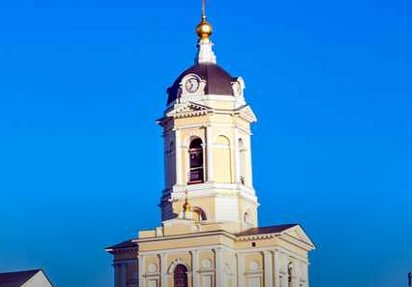
How does the cost of living of a pensioner affect the size of the pension?
The first thing that every pensioner should know when applying for a living wage is that its amount directly depends on whether you are working or are an unemployed pensioner. Since in the first case the amount will be 10,573 rubles, and in the second - 8,078, which is significantly lower than the first amount.
Next, we will answer the most common answer regarding the connection between the size of the pension and the cost of living. These two units are in no way connected with each other and have different components. For example, for those whose pension is an amount equal to the minimum, no additional or preferential payments will be provided. And for those who need them, they will be assigned without fail.
Working pensioners
The subsistence minimum is taken as the basis when determining the amount of the regional pension supplement. The amount of 14,311 rubles is the minimum pension for residents of the Russian capital. An increase in the cost of living in 2020 will inevitably lead to a recalculation of pension benefits for this category of citizens. The length of stay in Moscow also affects the provision of benefits.
Note ! _ If the period is more than 10 years and this fact is confirmed by the documents provided, a resident of the capital receives the right to an additional surcharge from the local budget. In addition, as discussed above, pensioners living in the capital can become owners of a number of benefits.

Length of residence in Moscow affects the provision of benefits
These include:
- payment for a travel ticket;
- residents receiving a pension can choose a benefit in the form of free travel or receive monetary compensation for funds spent on travel;
- referral to sanatorium-resort treatment if there are medical indications (possibly even with compensation for funds spent on transportation costs);
- the frequency of receiving a voucher can be once a year, but on a first-come, first-served basis;
- subsidies when calculating utility bills - a pensioner has the right to a discount when paying for housing and communal services;
- preferential amounts when concluding contracts for the use of communication means - landline telephone;
- reduction of the amount by 50% for connecting and receiving a package of cable television services;
- preferential treatment in dental clinics;
- free receipt, preferential purchase or discounts when purchasing a number of medications in accordance with the approved list;
- tax benefits for a number of real estate transactions, payment of land and transport taxes, personal income tax;
- additional social compensation up to the minimum subsistence minimum level for pensioners of constituent entities of the Russian Federation.
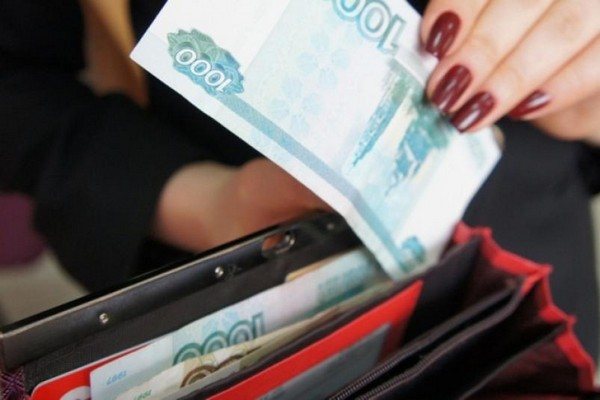
Pensioners - residents of Moscow - may qualify for certain additional benefits
How is the social supplement to the subsistence level financed?

There are two types of social supplement:
- Federal surcharge.
- Regional surcharge.
The only differences between them are that they differ in the sources that provide them with money and the place where they apply for these payments.
Elena Smirnova
Pension lawyer, ready to answer your questions.
Ask me a question
It is also necessary to know that the social supplement is assigned only if the entire income, which consists not only of the pension, but also of other additional payments, is less than the established amount.
It should also be noted that the amount of this additional payment is determined individually for each pensioner, since everyone’s income is different.
Deductions from pension
Up to 70% of the pension can be withheld from a pensioner according to executive documents. In what specific cases can this happen? The articles of the federal law “On Insurance Pensions” provide a list of grounds for withholding:
- mandatory documents;
- in the event of changes in the amount of the pension (for example, a change in the region of residence) and a violation of the obligation to notify the structure of the pension fund, the latter may provide a decision on the return of excess transferred amounts;
- If the court establishes abuses committed by a pensioner, certain amounts are recovered.
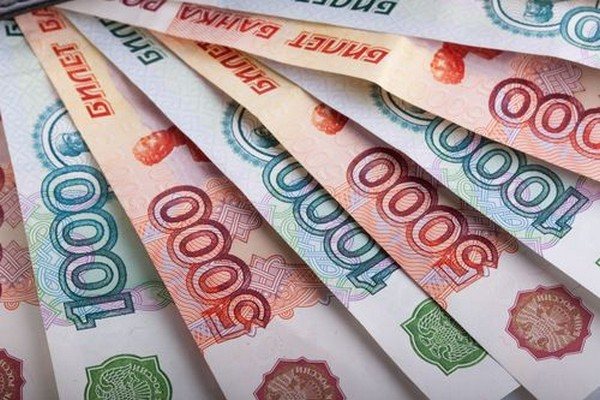
In some cases, part of the pension may be withheld from the pensioner
Note ! _ The amount of withholding should not exceed 50% of the total pension amount.
20 percent is withheld if it is necessary to compensate for damage due to a crime, harm caused to health, damage due to the loss of a breadwinner, or the collection of alimony.
Can a pension be lower than the minimum monthly wage?
According to the law, the minimum pension cannot be less than the PMP, which is established for the subject of residence. The additional payment is accrued regardless of the type of pension provision received. This means that the elderly person should receive the amount with an increase.
If an elderly person continues to work after retirement, supplements to old-age or disability pensions are not paid.
It is believed that he receives a salary, which means he does not need financial support. After all, his income consists of at least two sources. At the same time, payment for full-time work cannot be lower than the minimum wage: in 2020, the minimum wage is 11,280 rubles.
- 10 easy ways to get rid of forehead wrinkles at home
- 7 style tips for people over 40
- What benefits are available to pensioners and labor veterans of the Russian Federation?
Social supplement to pension
The difference between the amount of pension provision and PMP is called social supplement. Pension subsidies for non-working pensioners are allocated from different budgets - federal or regional. Established from the 1st day of the month following the month of circulation. Only citizens permanently residing in Russia can count on it.
The type of pension supplement depends on the amount of PMP determined by the recipient’s area of residence:
- Federal social benefit. It is assumed if the PM for the region is less than the federal value. Paid through the Pension Fund simultaneously with a pension from the federal budget. For example, a resident of Bryansk received a pension of 7.5 thousand rubles. The regional PMP is 8,523 rubles. This is less than the value established in Russia as a whole. The pensioner will receive an additional payment of 1,346 rubles (8,846 – 7,500 = 1,346) through the Pension Fund.
- Regional social supplement. Provided for in regions where PMP exceeds the federal figure. It is accrued through the social protection authorities from the region’s budget funds. In Moscow, you can apply for additional payment through the website of the mayor of the capital or. For example, an elderly person lives in the city of Istra and has received a pension of 7.5 thousand rubles. According to the law of the Moscow region, the amount of PMP for 2020 is 9,908 rubles. A non-working pensioner will receive a pension supplement from the regional budget through social security of 2,408 rubles (9,908 – 7,500 = 2,408).
- No surcharge. If the PMP budget for the region coincides with the federal value, the pensioner does not receive any additional money.
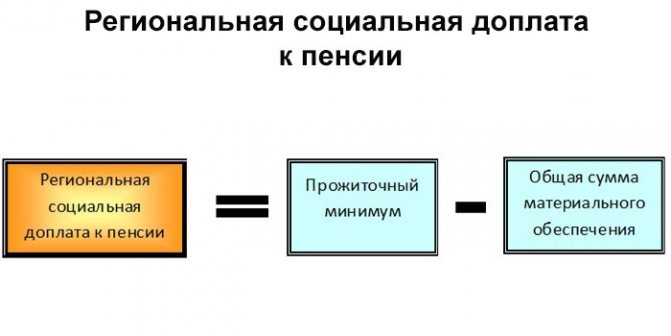
Regulation of indicators at the regional level
Minimum wage in the regions, according to Art. 133.1 of the Labor Code of the Russian Federation, can be determined in accordance with a tripartite agreement between representatives of employers, employees (through the mediation of trade unions) and local authorities. It cannot be less than the federal one. When developing, the parties are guided by the local PM level.
The subsistence minimum in the regions is determined once a quarter based on the principles set out above, taking into account consumer prices and the list of goods from the consumer basket. In the Moscow region, a separate law on this procedure was adopted - No. 13/98-OZ of April 28, 1998; its provisions practically duplicate the norms of the federal act.


